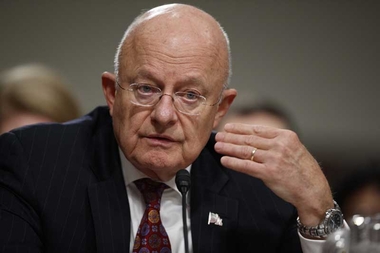Democrat criticizes Obama for slow response to Russian hacks

WASHINGTON (AP) — The Senate intelligence committee's top Democrat criticized the Obama administration on Tuesday for its slow response to allegations of Russian hacking during the presidential campaign as the panel heard from the director of the FBI, whom several Democrats criticized for announcing a new probe of Hillary Clinton's emails 11 days before the election.
Sen. Mark Warner's comments reflected the ongoing discontent among Democrats with how President Barack Obama handled evidence of the Kremlin's tampering with the U.S. democratic process. The Virginia Democrat said the administration deserved at least some criticism for the pace of its response and made clear he thought it should have acted sooner and stronger.
FBI Director James Comey and James Clapper, the director of national intelligence, were speaking to the committee about the conclusions of a report presented last week by U.S. intelligence agencies to Obama, President-elect Donald Trump and senior members of Congress. An unclassified version also was made public, outlining the agencies' claims of Russian actions designed to undermine the election and help Trump by hurting Clinton.
While Democrats say they accept the vote, many lawmakers feel that if Obama and his intelligence agencies were more forthright in the run-up to the election about putting up red flags and warning signs, the result may have been different.
Sen. Richard Burr, R-N.C., the intelligence committee's chairman, said he had no reason to doubt the findings of last week's report. But he said "our democracy is not at risk," adding that Americans can have faith in the democratic process. And he said his committee's staff would assess the sourcing behind the intelligence agencies' conclusions.
The declassified report explicitly tied Russian President Vladimir Putin to the hacking of email accounts of the Democratic National Committee and individual Democrats like Clinton's campaign chairman, John Podesta. Russia also used state-funded propaganda and paid "trolls" to make nasty comments on social media services, the report said, although there was no suggestion such operations affected the actual vote count.
The report lacked details about how the U.S. learned what it says it knows, such as any intercepted conversations or electronic messages from Russian leaders, including Putin. It also said nothing about specific hacker techniques or digital tools the U.S. may have traced back to Russia in its investigations.
Putin spokesman Dmitry Peskov told reporters on Monday the Kremlin believes the U.S. accusations of election hacking have no substance. He called them "amateurish."
According to U.S. intelligence agencies, Russia provided the emails to WikiLeaks. The website's founder, Julian Assange, has denied that is the case, but Democratic and Republican members of Congress have largely backed the accusation and many have demanded a sterner response than Obama has ordered.
Obama struck back at Moscow in late December with penalties aimed at Russia's leading spy agencies, the GRU and FSB, that the U.S. said were involved in the hacking. The GRU is Russia's military intelligence agency. The FSB is the main successor to the Soviet-era KGB.
On Monday, the U.S. levied economic sanctions against five Russians in connection to a 2012 U.S. law punishing Russian human rights violators. Americans are now banned from doing business with the men and any assets they may have in the United States are now frozen.
The most prominent individual targeted by the new sanctions is Alexander Bastrykin, who heads Russia's main investigative agency and is close to Putin. The two attended the same university together.
___
Associated Press writer Vladimir Isachenkov in Moscow contributed to this report.
By EILEEN SULLIVAN and DEB RIECHMANN , Associated Press.
Copyright Associated Press. All rights reserved.
The Gayly - 1/10/2017 @ 1:21 p.m. CST.





